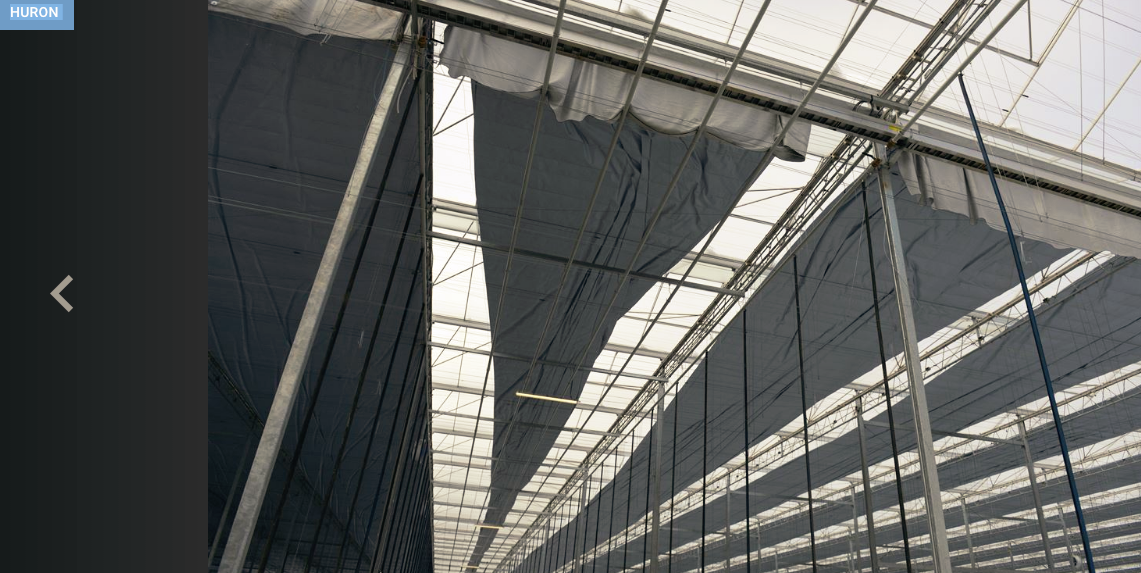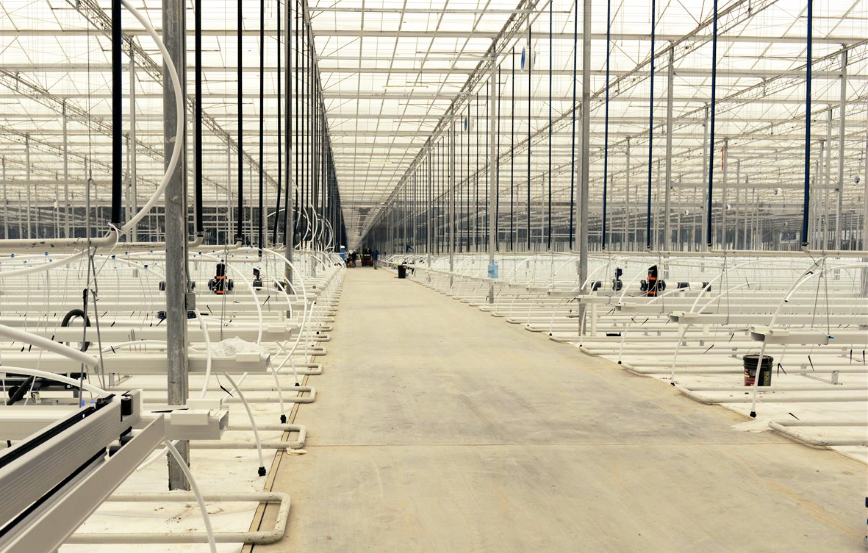Mucci Farms, A $70M Investment In Huron, Ohio, Continues To Grow
Mucci Farms, A $70M Investment In Huron, Ohio, Continues To Grow
3/9/2018
HURON
Construction work continues on the first of three planned Mucci Farms greenhouses, each 25 acres large, in Huron near BGSU Firelands. Executives anticipate the process of planting environmentally conscious fruits and vegetables will begin later this month. After a 10-week growth period, the food will be ready for distribution and sent to several supermarket chains across North America. -- Register photo/ERIN McLAUGHLIN
HURON — They’re just days away from planting all-important seeds carrying great weight for the company’s, city’s and cultivation communities’ futures.
Construction work continues on a $70 million privately funded, groundbreaking agricultural venture in Huron.
Introduced, developed and entirely paid for by Mucci Farms, the Canada-headquartered company recently finished building its first of three greenhouses after breaking ground in spring 2017. Blueprints show each glass structure totaling 25 acres in size. There’s also a warehouse, for shipping and distribution purposes, connecting all three greenhouses.
By next week, workers can begin seeding non-GMO crops — namely for tomatoes, cucumbers, peppers, eggplants and strawberries — in the first completed greenhouse. Crews should finish the other two greenhouses within a year’s time.
All food cultivated from the greenhouses will eventually get shipped to major supermarket chains contracting with Mucci across North America. This would include Kroger and Wal-Mart.
Sophisticated, energy-efficient systems for heating and electricity create an ideal environment to grow crops year-round, no matter if it’s 90 degrees and humid in July or 10 below zero in January.
“We have to make sure, especially in the wintertime, that we keep a consistent climate,” said Dave Loewen, Mucci Farms’ general manager who’s helping supervising efforts in Huron. “We are basically trying to create summer inside all year so the crops can grow optimally.”
Then there’s a computer-controlled irrigation program, which knows exactly when an individual plant needs more or less water. Sitting and growing in its own station, a “growing medium,” each crop receives an individual spigot to receive proper nutrients.
Mucci Farms, which operates five facilities and about 175 acres in Canada, incorporates a hydroponic process, meaning it relies on water and not soil to grow crops. With tomatoes, for instance, they need enough minerals so their vines can grow upward of 47 feet tall.
Yet the company doesn’t completely ignore the outdoor elements. Combining both systems, Mucci executives contend, produces better tasting and overall healthier foods.
“Mother Nature is still active in our greenhouse ecosystem,” according to a company statement. “Bees fly around to pollinate the plants and, rather than pesticides, we use a program … where ‘good bugs,’ such as ladybugs, prey on ‘bad bugs.’ Additionally, we’re able to use a fraction of the land and water that traditional farming requires with high yields and by sterilizing and recirculating our run-off water.”
Mucci Farms also does it best to protect the outside environment.
“By growing on elevated benches and troughs, we can achieve a high caliber of cleanliness,” the statement read. “We recycle all of our leachate irrigation water to reduce our footprint on the environment.”
During a recent tour with city officials, Loewen expressed his awestruck emotions for the project in Huron.
“To see this, knowing a year ago we were walking through trees, and being able to walk inside a greenhouse, and how everything else is accomplished, is pretty impressive,” Loewen said.
Many consider Mucci Farms the future of farming and agriculture. Local officials, meanwhile, couldn’t be happier the pioneering project is happening in Huron.
“This is so unbelievable and such a great opportunity to create partnerships for the city and others,” Huron city manager Andy White said. “We are so excited about this and the huge impact it will have on the local economy.”
More about Mucci
Q: What is Mucci Farms?
A: Since the 1960s, Mucci (pronounced moo-chee) Farms has grown non-GMO produce — specializing in tomatoes, cucumbers, peppers, eggplants and strawberries — inside factory-size greenhouses.
A sophisticated, high-wattage lighting system helps products, in a matter of weeks, evolve from tiny seeds to fully grown crops dangling off upward of 47-foot vines.
Mucci Farms, headquartered in Kingsville, Ontario, directly north of Pelee Island, sells its hydroponic crops — a process incorporating mineral nutrient solutions in water and not soil — to wholesalers and major corporations, such as Kroger, Trader Joe’s, Costco, Wal-Mart and others.
“The whole locally grown concept has really taken off,” company CEO Bert Mucci previously told the Register. “That is what the wholesalers and retailers want.”
Q: Why would Mucci Farms want to locate a base in Huron?
A: Bert Mucci explained why Huron represents the perfect location for his company’s first U.S. base.
“It’s a unique opportunity for us because of (Huron’s) proximity to our markets and our headquarters,” Mucci said. “About 65 percent of our production right now is delivered across the border (from Canada to the U.S.). Because of that, being in the U.S. is really attractive to us.”
Q: Are there any other reasons Mucci is coming to Huron?
A: Mucci Farms came to the city because Huron Public Power could promise the company the least expensive electric rate for the greenhouses.
Huron’s publicly managed utility company can provide Mucci with extremely affordable electric rates associated with a large volume of consumption associated with greenhouse-grow lights, officials said.
The company will install blackout curtains to cut down on light pollution, ensuring people aren’t disturbed at night.
Q: Who else benefits from this deal?
A: Several entities stand to reap the windfalls of a $70 million investment.
For starters, Huron Schools would receive an injection of property tax money from new development.
Additionally, BGSU Firelands students could also enroll in special agricultural classes, learning firsthand how a specialized greenhouse operates.
The 100 initial jobs created would also lower unemployment levels and no doubt stimulate the local economy, according to area officials.
Plus retail giants purchasing Mucci-made produce would recognize Huron as a key location for their operations, a possible prelude to more development within the area.
Business brief: Mucci Farms
• What: In Huron, construction continues on the company’s first U.S. base, which focuses on growing crops hydroponically, an energy-efficient, environmentally friendly process incorporating water and not soil.
• Where: It’s being built on a plot of land wrapping around Rye Beach and Bogart roads, beside BGSU Firelands.
• When: The first crops should be planted next week. Workers will care for them over a 10-week period, ready for distribution and consumption this summer.
• How much: The investment in constructing and developing this facility totals $70 million, all paid by company ownership.
• Jobs: Upon starting, the company wants to hire 100 workers and wants to eventually increase the number to 250. People can apply for jobs by visiting muccifarms.com/careers.











